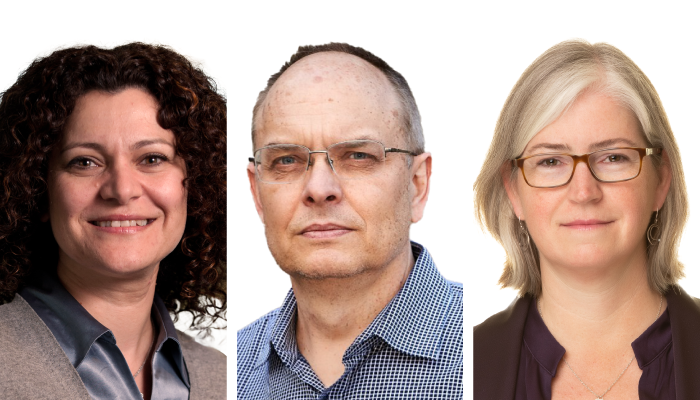Celebrating 15 Years of HAHSO Innovation Grants

Since its inception 15 years ago, Hamilton Academic Health Sciences Organization (HAHSO) Innovation Grants have been vital to local health sciences innovation funding. Over its history, HAHSO has funded 176 projects and distributed over $27 million in important seed funds to local physician researchers.
The opportunities provided by HAHSO have resulted in many noteworthy local health innovations. We reached out to three past recipients to learn more about their successes and how HAHSO Innovation Grants pushed their discoveries forward.
Zainab Samaan, professor, Department of Psychiatry & Behavioural Neurosciences
Health innovation in managing opioid addiction – funded in 2016
“Our team secured HAHSO funding for what came to be known as the Genetics of Opioid Addiction (GENOA) study, which aimed to identify genes affecting opioid addiction treatment responses. With this support, we recruited and genotyped 1,390 study participants.
Expanding GENOA into the Pharmacogenetics of Opioid Substitution Treatment response (POST) study, we obtained funding to support the recruitment and genotyping of an additional 2,500 study participants. This led to two CIHR-funded grants for research on cannabis use and vaping within the opioid use disorder population.
This work yielded over 30 publications describing health status, risk factors, and genetic contributions. Students were able to publish and present at conferences, resulting in five master’s and six PhD graduations. Currently, two post-doctoral fellows are working with GENOA and POST data, while three PhD students are continuing their training to becoming physicians in addiction medicine and psychiatry.
The next steps would be conducting multi-ethnic genetic study using the GENOA and POST data. We aim to accomplish this in conjunction with the Canadian Longitudinal Study on Aging and Ontario Health Study control data, linking cohort data with administrative health databases.
HAHSO fundamentally expanded our project into a comprehensive research program, contributing significantly to understanding the opioid crisis through clinical, educational, research, and capacity-building efforts.”
Mark Crowther, professor and chair, Department of Medicine
A multidisciplinary clinic to improve the control of anticoagulant therapy – funded in 2009
“Our project was originally funded to allow us to set up and evaluate a pharmacist-led anticoagulant (blood clot preventative) clinic run out of the pharmacy at St. Joe’s.
This clinic is designed to provide expert care in managing blood thinning medications provided by pharmacists who work in the hospital’s inpatient setting. The pharmacist-led clinic is a complement to a much larger physician-led clinic serving unique patient populations, such as those with kidney disease.
At the time it was founded, such a service model was almost unique in Canada, although several similar clinics have been put in place since then. Our innovation allowed us to replace a physician-led clinic, which can often be an inefficient use of patient and physician time, with an initiative run by pharmacists using external labs and state-of-the-art software.
All of this would not have gotten off the ground without HAHSO funding, which also allowed us to undertake a prospective cohort study of anticoagulant strategies. With sustainable financing established, the clinic continues to deliver high-quality, pharmacist-led care with excellent clinical outcomes, which is a dramatic improvement.”
Melissa Parker, associate professor, Department of Pediatrics
SQUEEZE Trial: A Trial to Determine whether Septic Shock Reversal is Quicker in Pediatric Patients Randomized to an Early Goal Directed Fluid Sparing Strategy vs. Usual Care – funded in 2016
“At the time of application to HAHSO, our then-pilot study focused on resuscitation strategies in pediatric septic shock patients was in the final phases of recruitment and demonstrated the feasibility of recruitment. HAHSO granted us funding for a definitive phase of the study.
Our work aimed to determine if a “fluid sparing” resuscitation strategy, which emphasizes early use and escalation of medications to improve blood flow, would result in better clinical outcomes without increased adverse events.
The definitive phase resulted in the launch of a coordinating center at McMaster and the recruitment of 158 participants.
During this phase, the trial also received additional support from Canadian Blood Services and the CIHR New Investigator Award, which in turn led to a successful application in the 2016 CIHR Project Scheme Competition, granting us extra $1.9 million in operating funding. This enabled an expansion of the trial to 400 participants and the inclusion of more pediatric trial sites across Canada.
Besides supporting the trial itself, funding has facilitated linked studies investigating early sepsis biomarkers and experiences of substitute decision-makers and participants, notably the deferred consent process in SQUEEZE. The SQUEEZE Trial recently concluded, and we await the release of definitive results later this year.”
Call for submissions for this year’s HAHSO innovation grants
The current round of funding is still accepting applications from participating HAHSO physicians. To learn more please contact Erika at unellie@mcmaster.ca, or visit the HAHSO Site to submit your application via the online portal. The deadline for applications is Thursday, Sept. 28, at 12 p.m.
HAHSO is a part of the Innovation Fund, which is a joint initiative of the Ontario Ministry of Health and the Ontario Medical Association resulting from the Academic Health Science Centre Alternative Funding Plan. The Innovation Fund has funded over 1,500 projects and has made funding available to the more than 5,000 academic physicians working in 17 of Ontario’s Academic Health Science Centres – including those at McMaster University.
HRS